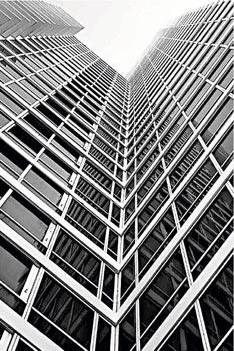
15 minute read
Case Law and Legislative Update
LEGISLATIVE & CASE LAW SUMMARY
It is that time of the year when we look back at what happened in the legal world of community associations and we look forward to new changes in the law. The following is a brief summary of those changes and how they affect community association living.
Advertisement
Legislative Changes:
The Illinois Assistance Animal Integrity Act– Effective January 1, 2020. The Fair Housing Act and Illinois Human Rights Act provides that a housing provider, which includes community associations, may require a person who requires the use of an assistance animal to provide reliable documentation of the disability and the disability related need for the animal, if the disability is not readily apparent or known to the housing provider. The housing provider may require the person to submit the request on a standardized form and to submit specific documentation. Such documentation shall include a written request, a certification from an individual who has a “therapeutic relationship” with the requesting person, and which describes the individual’s disability related need for the assistance animal. “Therapeutic relationship” is defined in the Act as one who in good faith and with actual knowledge of the individual’s disability and who is a physician or other medical provider, a mental health service provider or a non-medical service agency or other reliable third party who is in a position to know about the individual’s disability. The Act eliminates generic certifications. The Act also includes language that allows the housing provider to deny a request if the accommodation imposes an undue financial and administrative burden or if it requires a fundamental alteration to the nature of the operation of the housing provider. The housing provider may also deny a request if there is reliable objective evidence that the specific assistance animal poses a direct threat to the health or safety to others, which cannot be eliminated or reduced; causes substantial physical damage to the property that cannot be eliminated or reduced; or has engaged in a pattern of uncontrolled behavior. The housing provider may balance the disability related needs of all residents.
Natural Gas and Electric Energy Services and
Solutions
CenterPoint Energy Services (CES) provides a wide range of competitive natural gas and electric services with energy solutions that meet our customers’ unique needs. • Competitive pricing • Personal, local service • Operational and market expertise Contact Vickie Farina at 630-795-2594 Vickie.Farina@centerpointenergy.com Visit us at CenterPointEnergy.com/CES
Reliable service. People you trust.

Cannabis Regulation and Tax Act – Effective January 1, 2020. The new Cannabis Act, which will permit recreational use of marijuana, creates a new Section 33 of the Illinois Condominium Property Act. Section 33 allows a condominium association to amend its declaration to prohibit and limit the smoking of cannabis within an owner’s unit. A condominium association’s Rules and Regulations cannot otherwise restrict consumption of cannabis by any other method within a unit or the limited common elements. Rules and Regulations can only restrict any form of consumption on the common elements. While this Section allows a condominium association to restrict smoking of cannabis in a unit or limited common elements, the association cannot prohibit other forms of consumption in those areas. Please note that this is only an amendment to the Illinois Condominium Property Act and not to the Common Interest Community Association Act. While not applicable, it still is a good guide for common interest community associations on what process they too should follow to prohibit smoking of cannabis within an owner’s unit or home.
FHA Approval – Effective October 15, 2019. The Department of Housing and Urban Development revised its regulations for obtaining a loan that is insured through the Federal Housing Administration. Most notably, the new regulations allow for a single-unit approval process, whereas previously, an entire association was required to receive FHA approval before FHA insured loans would be approved. Several other changes, such as increasing the maximum number of units allowed to have FHA insured loans and streamlining the process for obtaining approval will encourage the use of FHA loans, and should facilitate the purchase of units within associations.
The Community Association Manager Licensing and Disciplinary Act – Effective immediately; pending approval. House Bill 1268 has been passed in both chambers of the Illinois Legislature. This Bill amended the Regulatory Sunset Act, which is a law that simply states upon what date current regulations will be repealed. The Community Association Manager Licensing and Disciplinary Act will no longer be repealed on January 1, 2020. Instead, it will be repealed on January 1, 2022, meaning all current state regulations for community association managers will stay in effect. The bill was passed by the House and Senate and was sent to the governor for his signature. (Will 2020 be the year we see rules and learn what are the educational requirements for community association managers?)
Workplace Transparency ActEffective January 1, 2020 Senate Bill 0075 was enacted in order to prevent unlawful discrimination and harassment in the workplace. This Act creates several protections for employees, including: requiring employers to provide sexual harassment trainings at least once per year; prohibiting employers from disclosing the name of victims of harassment and/or discrimination; limiting contractual provisions that require the victim to use arbitration; and allowing victims of gender-related violence to take unpaid leave to seek treatment. The Act applies to employers of over 15 employees, but certain provisions apply to employers of any number of employees. For example, the provision managing sexual harassment training applies so
BALLOT PAPER ■ More of the Same ■ Change
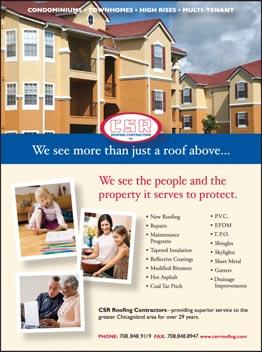

Ready for Change? Before your management contract automatically renews, call ACM and learn about our exceptional management services. Quality management services for condominium, townhome and homeowner associations.
COMMUNITY MANAGEMENT





SERVING ALL OF CHICAGOLAND WWW.ACMWEB.COM 630.620.1133
long as an employer has at least one employee, and protections against harassment are extended to all employees as well as “nonemployees” (any person performing services for the employer pursuant to a contract with the employer).
Chicago Condominium Deconversions –Effective October 16, 2019. This Section of the Municipal Code of Chicago, 13-72-085, increased the minimum percentage of a vote of Unit Owners required to elect to sell the property to 85%, and a greater minimum percentage can be provided for in an association’s Declaration or By-Laws.
Post-Judgment Collections – Effective January 1, 2020 Because condominium and community association assessments are considered to be consumer debts, changes to Illinois law for post-judgment collections of consumer debt will apply to judgments obtained against Unit Owners for unpaid assessments. Statutory interest on judgments of $25,000.00 or less has been decreased from 9% to 5% per annum. Consumer judgments can be revived no later than 10 years after entry. This in effect decreases the maximum time allowed to collect on a consumer judgment from 27 to 17 years. Judgments obtained prior to January 1, 2020 will not be governed by this amended law.
Summary of Cases Decided in 2019
Ruiz v. Cal-Ful Condominium Association, 2019 IL App (1st) 181734. Developer/Owner filed suit against the condominium’s Board for failure to produce records in accordance with Section 19 of the ICPA and sought attorney’s fees based upon this failure to produce certain books and records. Because the facts of this case occurred prior to the 2018 update to the Illinois Condominium Property Act (ICPA), the older version of the statute applies, and a finding of bad faith by the Board is required in order for attorney’s fees to be awarded to the owner. Ultimately, here, the Plaintiff failed to allege facts sufficient to demonstrate bad faith. Now, that the 2018 ICPA revisions have occurred, this case serves as a reminder that there is no longer a requirement of bad faith, and it is critical that the association produce documents within the ten-day window provided in Section 19 of the ICPA.
Porada v. Lavelle, 2018 IL App (1st) 171818. After an association filed suit against an owner for violation of the association’s Rules and Regulations, the owner filed suit against the individual members of his association’s Board of Directors, alleging slander and libel as well as the infliction of emotional distress. The Court dismissed the owner’s suit, holding that the owner failed to adequately allege wrongdoing by the Board. In his concurring opinion Justice Delort writes, “This case proves the rule that many condominium disagreements are so acrimonious that they generate financial and emotional costs far disproportionate to the original dispute.”

Sienna Court Condominium Association v. Champion Aluminum Corp., 2018 IL 122022. The purchaser of a newly constructed condominium pursued a claim for breach of an implied warranty of habitability against subcontractors who helped to construct the building. The Court held that where there is no contractual relationship between the parties, and the purchaser is only seeking monetary damages, the owner cannot pursue a claim for damages against the subcontractors.
Siena at Old Orchard Condominium Association v. Siena at Old Orchard, LLC, 2018 IL App (1st) 182133. In an earlier case between the parties in 2017, the Appellate Court held that a declaration amendment was valid, where the amendment removed a requirement that parties first engage

in mediation and arbitration before filing suit. The 2018 case considers whether the amendment applies retroactively, as the events that form the basis of the lawsuit occurred before the amendment was effective. The Court held that the amendment does not apply retroactively to the lawsuit, and the mediation and arbitration requirements apply.
Kasper v. McGill Management Inc. & Woodstone Townhome Homeowner’s Association, 2019 IL App (1st) 181204. After a light dusting of snow, the evening prior, a unit owner sued both the management company and association after he slipped and fell walking from his unit to the mailboxes. The snow removal contract between management and the association called for removal of snow after an accumulation of two inches or upon the association’s request. Because the dusting of snow was less than a half inch, the Court affirmed the rule that landowners owe no duty to remove natural accumulations of snow and ice from their property. Additionally, because snowfall was under the minimum accumulation in the snow removal contract, the management company did not breach any duty of care.
The Oak Run Property Owners Association, Inc. v. Basta, et al., 2019 IL App (3d) 180687. Unit owners applied for an architectural and landscaping permit from the association’s Architectural and Environmental Control Committees (AEC) for the construction of a detached garage and accompanying landscaping, which was approved by the AEC. Subsequently, the contractor sought approval of a modification from the AEC’s inspector for the installation of a retaining wall. It was the common practice of the association to allow the AEC inspector to approve “minor” alterations in previouslyapproved permits, and installation of the retaining wall – even though the wall crossed into a utility easement and the plans for the wall failed to include any dimensions – was granted. When the residents of the neighboring home returned home after a trip, they immediately filed a complaint, as the completed retaining wall measured ten to eleven feet in height and was approximately two feet from their home. The Court evaluated whether the unit owners violated the Association’s Rules and misled the AEC when submitting their plan. The Court ruled that
the wall violated the association’s governing documents, which prohibits the construction within utility easements. However, the unit owners were not ordered to remove the completed wall. The Court held that after evidentiary hearings, the neighbor’s property value declined by $10,000.00 because of the wall, and the neighbor was only entitled to monetary relief.
Case Law, Unpublished – Cannot be Cited as Precedent
Countrylane Condominium Association v. Barghouthi, 2018 IL App (3d) 170630-U. The association brought an Eviction Action against a third-party purchaser to recover preforeclosure common expenses. The Court held that because the sheriff ’s notice of sale failed to give notice of the association’s lien as required by section 9(g) of the ICAP, the lien was unenforceable against the Unit Owner.
Deerpath Consolidated Neighborhood Association v. Lake County Board of Review, 2018 Il App (2d) 180244-U. The association authorized its attorney to file an appeal with the Lake County Board of Review, challenging the assessments of properties within the association. The Board of Review filed a motion to dismiss, arguing that the association lacked standing to appeal the property assessments, because the appeal related to the members’ privately-owned properties – single family homes on individual lots – as opposed to appealing an assessment of the Common Elements. The Court refused to rule on whether the Association had standing; instead, ruling that the Board of Review failed to adequately plead a lack of standing.
Fritz v. Lake Carroll Property Association, 2019 IL App (2d) 180329-U. Unit owner sued the association, challenging a provision in the Rules that required all septic systems on private property within the association be professionally pumped at four-year intervals. The owner made two arguments; first, the owner argued that the association cannot enact any Rules which limit the use of his land. The Court clarified that the Rule was not a limitation or restriction, but merely a regulation to ensure that the lake, which is surrounded by the association, remains clean and healthy. The Court explained, because the association’s Declaration and Covenants outline the Board’s powers in the By-Laws, and because the By-Laws provide the authority for enacting Rules and Regulations, the requirement to regularly clean septic systems is within the association’s power. Members in a voluntary association agree to abide by the Rules and Regulations adopted by the organization. Second, the owner argued that because the Rules were not recorded, they were unenforceable. The Court rejected this contention outright, because unlike an association’s declaration, there is no statutory requirement to record rules and regulations.
Silo Ridge Homeowners Association v. Abercrombie, 2019 IL App (1st) 182262-U. Unit owner appealed a judgment for possession and unpaid assessments entered in favor of the association, arguing that either the Court erred
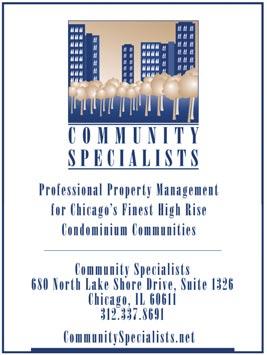
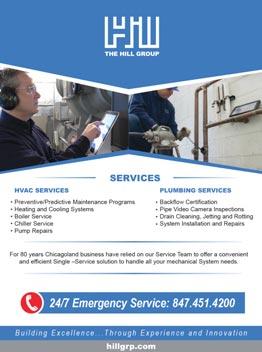
in granting the association attorney’s fees and court costs or that the amount of fees and costs awarded was unreasonable. The Court held that an unsuccessful party is responsible for the other party’s attorney’s fees, when authorized by statute or contract. Here, because the Declaration provided that owners are responsible for the payment of assessments and attorney fees related to a collection action, there was a contractual basis between the parties to award attorney’s fees to the association. The Court then considered the argument that the attorney’s fees awarded were unreasonable because the amount of attorney fees was greater than the judgment amount, but this reason alone does not justify rejection of the amount sought. Ultimately, the trial court’s award of attorney fees was upheld in full.
Connolly v. Milazzo, 2019 IL App (1st) 171906-U. Unit owner filed suit against the President and other Members of the Board of Directors of his association, alleging that the Board retaliated

against the owner for expressing criticism of the association. The defendants attempted to dismiss the case, asserting that the unit owner failed to adequately allege facts supporting his case, but the Court held that issuing violation notices for “offensive” activity when the unit owner was expressing criticism of the Board provided enough facts to proceed to trial for violation of Section 18.4(h) of the ICPA, which prohibits the Board from adopting any rule which impedes a member’s freedom of speech. The Appellate Court also reversed the award of attorney’s fees to the defendants, requiring the trial court to reevaluate if such an award is proper.
Eagle Ridge Townhouse Association v. Snapp, 2019 IL App (2d) 180634-U. The association filed suit against its former Board President and former management company, which was owned by the Board President, alleging misappropriation of association funds. In turn, Defendant filed suit against the association, its current Board Members, and the master association. The Appellate Court considered whether the master association engaged in defamation when it mailed meeting minutes and campaign flyers to association members. The Court held that, because the master association was simply stuffing and addressing envelopes – a service provided to any paying association member – it was not an “information content provider” and was not “publishing” defamatory statements. Therefore, the Court dismissed the claims against the master association.
Board of Managers of Ravinia Lofts Condominium Association v. Reliable Building LLC, 2018 IL App (1st) 172880-U. The association filed suit against the Developer, who in turn filed suit against an engineering firm. During the course of the lawsuit, the association and the Developer settled their lawsuit, and any claim the Developer may have had against the engineering firm was assigned to the association. Eventually, the association requested leave to amend its complaint to include the engineering firm; however, by this point in time, the statute of limitations for breach of contract had run out. The Court held that because the association’s claim against the engineering firm arose from a different set of facts as the Developer’s claim against the firm, the suit was time-barred by the statute of limitations. Y
PEDESTRIAN DOORS
REVOLVING DOORS
BEFORE AFTER
HIGH SPEED DOORS
FIRE DOORS
www.doorsystems.com (800) THE-DOOR
SECTIONAL DOORS
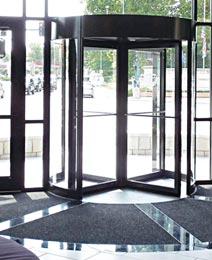
AUTOMATIC
DOORS INCLUDING ADA
STEEL ROLLUP DOORS
DOCK LEVELERS
FOR A LIMITED TIME, CALL US TODAY FOR GREAT SAVINGS ON WEATHERSEAL REPLACEMENT INCLUDING LABOR & MATERIALS
Door Systems has been serving greater Chicagoland for over 60 years. Since 1954, Door Systems has been specializing in the maintenance and repair of all makes and types of doors and dock equipment for your business. We guarantee on-site response time within 24 hours of your call. For an innovative solution to the most demanding of circumstances, schedule an appointment or speak with a sales professional about your door and dock equipment repair needs today.
www.doorsystems.com | (800) THE-DOOR









